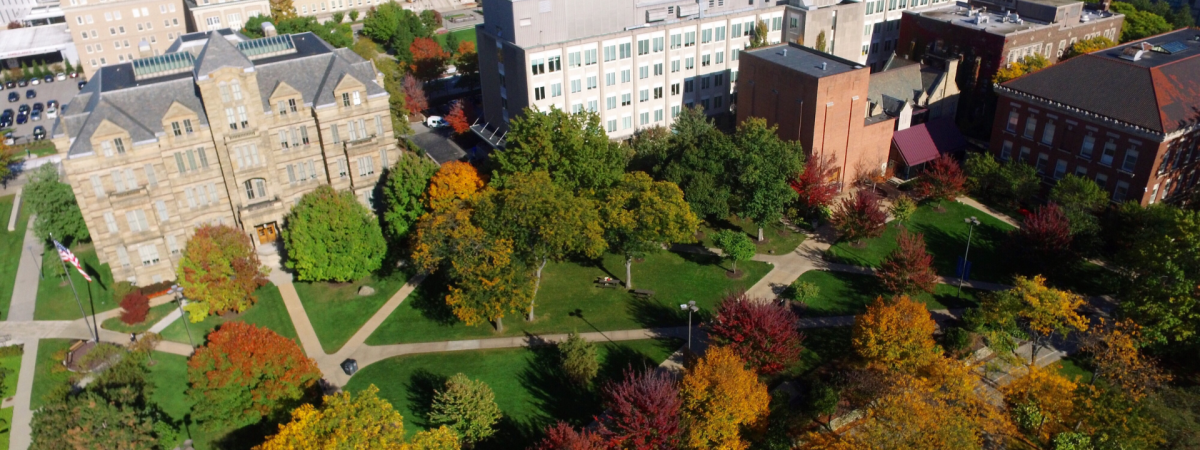Access the comprehensive resources of one of the nation's leading research universities through a single point of contact.
An Institution Forged Through Partnerships
For nearly 200 years, partnerships have been integral to Case Western Reserve University's mission, fostering collaborative endeavors that drive educational excellence and fuel boundless innovation. From the renowned Michelson-Morley experiment conducted in 1887 at between faculty from the neighboring Western Reserve University and the Case Institute of Technology, which laid crucial groundwork for Einstein’s Theory of Relativity, to the pioneering federation of those institutions in 1967 to establish Case Western Reserve University, the institution has consistently pushed boundaries and challenged the status quo through partnership. That relentless focus on collaborative innovation continues today through a leading approach to corporate engagement that is keenly focused on long-term mutual benefit through holistic partnerships between industry and higher-education. Partnerships with academia do not have to be difficult to identify and operationalize, the Corporate Engagement Center at Case Western Reserve University makes that possible.
What is the Corporate Engagement Center?
The Corporate Engagement Center (CEC) is a one-stop shop for corporate partners who wish to engage with Case Western Reserve University. The CEC aligns resources across the university to help industry partners access talent, upskilling, research, technology, and philanthropy. The CEC offers a concierge-like approach to industry engagement, making it convenient for industry partners to tap into the comprehensive expertise and solutions across the entire university though one phone call.
What can the CEC do for industry partners?
Talent Acquisition. Connect industry partners with top-notch students and alumni from a variety of programs spanning the arts and sciences, engineering, health sciences, law, management, and social work. Industry partners can benefit from the talent and skills of our community of innovators, knowledge-seekers and groundbreakers who are ready to tackle today's toughest problems and transform the future. Industry partners can also offer internships, co-ops, fellowships, and mentoring opportunities to students and alumni.
Professional Upskilling. Provide industry partners with professional upskilling and executive education programs to enhance the skills and knowledge of their workforce. Industry partners can choose from a range of open enrollment and customized programs that address their specific needs and challenges. Industry partners can also collaborate with the university to design and deliver innovative and impactful learning experiences for their employees.
Industry Sponsored Research. Facilitate industry sponsored research and collaborative projects with faculty and researchers who are at the forefront of innovation and discovery. Industry partners can access the cutting-edge research and facilities of the university and partner with our experts to find solutions to their business and societal challenges.
Technology Transfer and Startup Engagement. Help industry partners access and license cutting-edge technologies and intellectual property developed at the university. Industry partners can leverage the university's strong record of technology transfer and commercialization to bring new products and services to the market.
Brand Visibility and Philanthropy. Support industry partners' sponsorship visibility and philanthropic goals by creating customized opportunities for corporate social responsibility and community engagement. Industry partners can enhance their brand reputation and social impact by sponsoring events, programs, and initiatives that align with their values and mission.
How can industry partners get started?
If industry partners are interested in partnering with Case Western Reserve University, the CEC is their gateway to the university. Industry partners can contact the CEC team at corporate@case.edu. The CEC team works collaboratively with industry partners to understand their needs and goals, and match them with the best resources and contacts at the university while protecting partner confidentiality where needed. The CEC team also provides ongoing support and guidance throughout their engagement with the university to help identify additional opportunities for shared value.
The CEC is committed to building long-term and mutually beneficial relationships with industry partners. Whether industry partners are looking for talent, upskilling, research, technology, or philanthropy, the CEC can assist them in streamlining their engagement with a world class research university.


